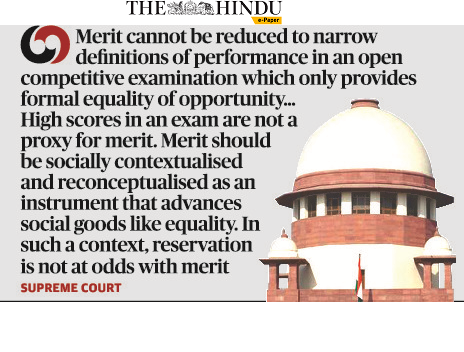ForumIAS announcing GS Foundation Program for UPSC CSE 2025-26 from 19 April. Click Here for more information.
ForumIAS Answer Writing Focus Group (AWFG) for Mains 2024 commencing from 24th June 2024. The Entrance Test for the program will be held on 28th April 2024 at 9 AM. To know more about the program visit: https://forumias.com/blog/awfg2024
What is the News?
The Supreme Court has upheld the constitutional validity of quota for Other Backward Classes candidates in National Eligibility cum Entrance Test’s (NEET) All India Quota seats for undergraduate and postgraduate medical and dental courses.
What was the case about?
Recently, the Central Government has announced to extend 27% reservation for OBCs and 10% reservation for the economically weaker section(EWS) under the All India Quota (AIQ) Scheme for undergraduate and postgraduate medical/dental courses.
But this was challenged before the Supreme Court.
What did the Supreme Court say?
The Supreme Court upheld the OBC quota in NEET admissions (On EWS Verdict refer here).
What are the arguments given by the court while upholding the OBC quota in NEET admissions?
Supreme Court on Reservation

The court held that reservation is not at odds with merit. It observed that Merit cannot be reduced to narrow definitions of performance in an open competitive examination, which only provides formal equality of opportunity.
Moreover, Open competitive examinations do not reflect the social, economic and cultural advantage that accrues to certain classes and contributes to their success in such examinations.
Hence, Merit should be socially contextualised and reconceptualized as an instrument that advances social goods like equality that we as a society value. In such a context, reservation is not at odds with merit but furthers its distributive consequences.
Supreme Court on Article 15
The power of the government to provide reservations under Article 15(4) and (5) of the Constitution is not an “exception” to Article 15(1) which enshrines the mandate that “the State shall not discriminate against any citizen on grounds only of religion, race, caste, sex, place of birth or any of them”.
Moreover, the power of the government to craft reservations for the OBC amplified the principle of “substantive equality” manifested through Article 15 (1).
| Note: Substantive equality is a fundamental aspect of human rights law that is concerned with equitable outcomes and equal opportunities for disadvantaged and marginalised people and groups in society. |
Source: This post is based on the article ‘Supreme Court upholds validity of OBC quota in NEET admissions’ published in PIB on 21st January 2022.




